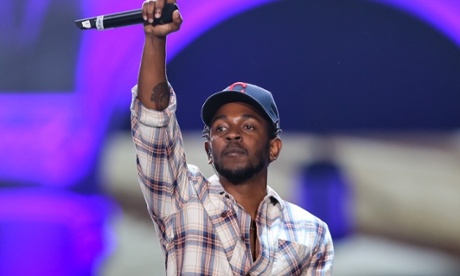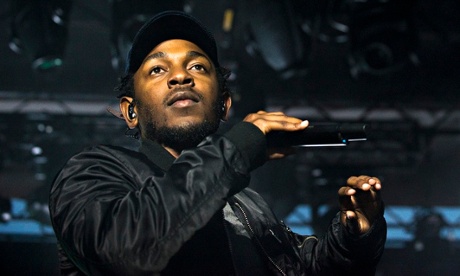Kendrick Lamar chose to lead his third album, To Pimp a Butterfly, with contrasting approaches to black self-empowerment: the radical, unconflicted self-affirmation of I and the darker underbelly of violence and hatred that necessitates it on The Blacker the Berry. The two singles had a symbiotic relationship – the celebratory singalong of I sounding less like a capitulation to a radio-friendly retro sound and more of a triumph in the light of The Blacker the Berry; I’s joyousness justifying the way The Blacker the Berry skirted around respectability politics. But if Lamar presented us with two flipsides of the subject in advance of To Pimp a Butterfly, the full 80-minute epic itself is an ambitious and at times overwhelming reflection of its multi-faceted complexity.
It starts with a formidable triple punch, each one from a different direction. Rich, burbling bass and a soulful chorus form the backdrop to Lamar worrying about being corrupted by the music industry on Wesley’s Theory. For Free? takes a sharp left turn into free jazz and what sounds like a parody of Nicki Minaj’s Lookin’ Ass before Lamar reiterates his value with cascading syllables, barely pausing for breath before the song arrives at its twist ending. King Kunta picks up the baton, twisting up the tale of an 18th century slave with disdain for Lamar’s competition over irresistible machine funk: “I was gonna kill a couple rappers but they did it to themselves/ Everybody’s suicidal, they don’t even need my help,” he spits, elastic and supremely confident in his superiority.
You’re left disorientated and thrilled, which turns out to be the perfect preparation for a densely layered album on which any given song is liable to end up in a completely different place from its beginning. To Pimp a Butterfly is a musical tour de force, a confounding and distinct artistic and political statement along the lines of Erykah Badu’s landmark 2008 album, New Amerykah Part One: 4th World War or D’Angelo’s long-awaited 2014 comeback Black Messiah. The languorous victory lap of Momma is jolted into unexpected, urgent uncertainty on its final verse; Lamar – who is, along with Nicki Minaj, one of the most vocally creative rappers of this generation – uses the full repertoire of his voices to create a cacophony of self-loathing on U. These Walls undercuts expectations several times over with the variety of uses its titular metaphor is put to; what starts as a sweet, sexual G-funk ode to pleasure ultimately ends with Lamar rapping his guilt as though underwater. Though Flying Lotus contributes only one production, this patchwork, constantly mutating approach to the arrangements bears his influence all over the album; even Pharrell Williams, a decade removed from his relevance as a producer of artistic quality, brings it on the dusty rhythms of Alright.
The first words you hear are “Every nigger is a star,” a sampled croon of Boris Gardiner’s 1974 soundtrack to the blaxploitation film of the same title, pointedly spelled as a slur. (Later, Lamar will soliloquise on “how the infamous, sensitive N-word control us” on a new outro to I, and attempt to redefine it as “negus”, an old Amharic word denoting royalty.) Lamar is already a star, though, and throughout To Pimp a Butterfly, the uplift of his people is intertwined with the personal guilt and self-loathing elicited by his own fame and platform. An encounter with a homeless man prompts a meditation on money on How Much a Dollar Cost; a femme fatale named Lucy offers a deal with the devil on For Sale?; a six-part poem gradually unfolds over the album, and even after it reaches a sort of resolution, its final line draws back from easy answers with a shrug.
It could all be glib in a lesser artist’s hands, but for the most part Lamar knows when to offer conclusions and when to offer questions and poetry. Not all of it holds up beyond initial admiration: the poem, as structurally disruptive as it is, seems more ponderous with each listen, while the seven-minute beyond-the-grave “interview” with Lamar’s hero 2Pac – whom he once claimed to have seen in a vision – that closes the album is an ambitious conceit that falls flat. Using audio from a 1994 2Pac interview, Lamar inserts his own questions – but while the poignancy of a man in 2015 describing the “turmoil going on” in society and “receiving” a relevant answer is undeniable, working off existent material renders the value of the exercise rather obscure. Meanwhile, for all Lamar’s rhetoric about black solidarity, it shouldn’t be overlooked that his uncredited use of Jamaican dancehall MC Assassin’s voice on The Blacker the Berry is the latest example of a rap trend for appropriating dancehall: it works here better than it did on Kanye West’s Yeezus, but withholding a feature credit from a man with such a substantial contribution is shady at best.
Throughout, there’s an important awareness of the gap between what a privileged, white audience needs to hear about injustice, its roots and effects – and what, on a personal level, an individual can find empowering. Bilal admonishing listeners, “Shit don’t change until you get up and wash your ass” on the hook of Institutionalized is not a helpful macro approach – but throughout To Pimp a Butterfly, Lamar uses such sentiments as a form of self-actualisation while always circling back to the larger picture. Still, the self-conscious literary ambition and political nature of To Pimp a Butterfly will doubtless play into the false binary critics have consistently drawn within rap, of the “good” conscious rapper concerned about his people’s standards versus the street and club rap that wallow cheerfully in good-time ignorance; it’s unclear at times whether Lamar is actively trying to untangle this or playing up to it. It’s when he offers outward-facing certainty that To Pimp a Butterfly hits the hardest – such as on Complexion (A Zulu Love), on which, assisted by a terrific verse from the under-appreciated Rapsody, he deftly picks apart a rotten history of divide-and-rule skin tone prejudice.










